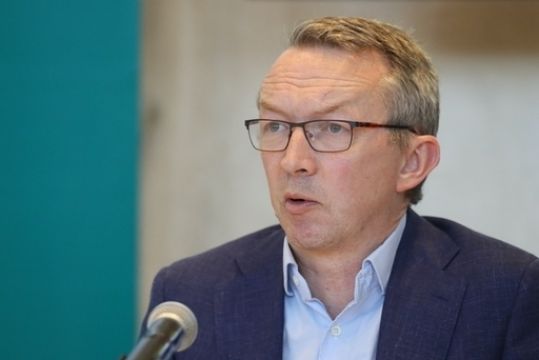The health service is committed to expanding models of care in the community to cope with the possibility of a 'twindemic' this winter, HSE chief Dr Colm Henry has said.
Concern has been raised of the system's ability to cope with the annual flu season, in addition to a spike in Covid-19 infections rates, with Dr Henry adding that a winter Covid surge was "possible but not inevitable".
Speaking to Newstalk Breakfast, Dr Henry said the pandemic had seen unprecedented expansion of the health care system.
Capacity remained an issue, he said, which was why they needed to diversify to other forms of care in the community.
Access to the system needed to flow, which was why vaccination for Covid and the flu had to be foremost, Dr Henry stressed.
He added that while the HSE’s surveillance system, which involves testing wastewater, had not yet detected any signs of new varieties of concern, the public should get both their flu vaccine and Covid booster to best protect themselves and their communities over the coming months.
The HSE will continue to access beds through the private sector, including community care, Dr Henry said, with 543 private beds being earmarked for community care, of which 75 per cent were currently in use.
When asked about the possibility of masks becoming mandatory on public transport again, Dr Henry said mask had not gone away and the advice remained that they should be worn on public transport.
“We can’t rule anything out,” he warned.
Shortages
Separately, the president of the Irish Hospital Consultants Association, Professor Robert Landers, said a shortage of acute hospital beds and of consultants will lead to huge pressures on the health system this winter.
The ongoing shortages will mean that the system will “lurch from crisis to crisis”, he told RTÉ Radio’s Morning Ireland.
Prof Landers was responding to the publication of the 2022/2023 Winter Plan, which includes the recruitment of over 600 new healthcare staff.
However, Prof Landers noted very few of these new posts would be consultants.
“I know the Minister [for Health] wants 50 [Emergency Department] consultants, but it takes 500 days to recruit a consultant, so they will not be in place until winter 2024.”
In the meantime, there remained 900 unfilled consultant posts and that number was increasing steadily, he added.
Prof Landers said that Ireland had 40 per cent of the EU average level of consultants and had under 40 per cent of the EU average of acute hospital beds.
He explained that by 2030, the system would need 5,000 acute hospital beds.
The Government and the HSE needed to face up to the fact that the system needed more consultants and more beds, Prof Landers said, adding that otherwise the crisis would reemerge each winter.







